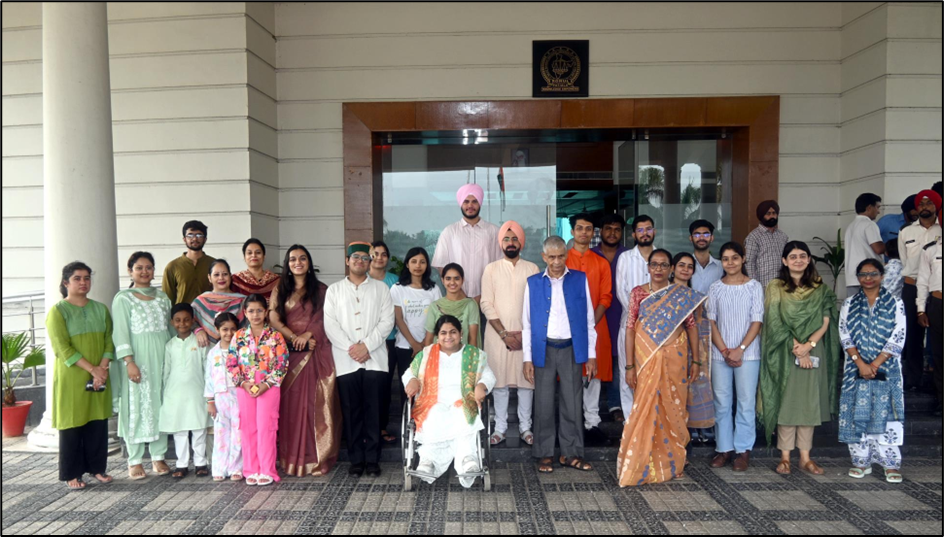In conversation with the Vice-Chancellor of RGNUL: A Visionary and Student Welfare Promoter
- rgnulcosmos
- Sep 11, 2022
- 3 min read
Updated: Sep 17, 2022

Interviewee: | Prof. (Dr.) G.S. Bajpai (Vice-Chancellor of RGNUL) |
Interviewer: | Nalinaksha Singh & Nayoleeka Purty (Co-Founder of RGNUL Cosmos) |
Introduction: Prof. (Dr.) G.S. Bajpai serves as the Vice Chancellor of Rajiv Gandhi National University of Law (RGNUL), Punjab. Equipped with more than thirty years of professional experience as an author, researcher, teacher and administrator, he has been appointed as Convenor, Committee for Reforms in Criminal Laws set up by the Ministry of Home Affairs, Government of India, which is tasked with spearheading historic reforms in Criminal Laws in India. He is the Member of the Advisory Board for Development of Legal Education & Legal Profession of the Bar Council of India; Member of the Standing Committee of the Legal Education Committee of the Bar Council of India; Member, General Council, Damodaram Sanjivayya National Law University, Visakhapatnam; Member, Punjab State Legal Services Authority and Member, State Legal Services Authority, U.T., Chandigarh. He has been nominated by the Association of Indian Universities as Member of the Board of Indian Association of Social Science Institutions (IASSI). Member of the Expert Committee of the UGC to frame guidelines for introduction of Course on Law for Holistic and Multidisciplinary Education. Recently, Prof. Bajpai has been designated as Distinguished Visiting Professor at the West Bengal National University of Juridical Sciences, Kolkata.
He has previously served as the Registrar, National Law University Delhi. He has also served as Professor of Criminology & Criminal Justice (Law); Chair Professor at K.L Arora Chair in Criminal Law; as well as the Chairperson of the Centre for Criminology & Victimology at National Law University Delhi.
His recent publications include Handbook of Laws and Case Laws for Victims of Crime, Thomson Reuters (2022) and Fast Track Courts in India Promise & Performance published by Satyam Law International (2022) is an empirical evaluation of the functioning of Fast Track Courts in Uttar Pradesh, Maharashtra, Tamil Nadu, West Bengal and Delhi. He is the editor of two prestigious international journals: Journal of Victimology & Victim Justice (published by Sage Publications) and Indian Journal of Criminology, a publication of the Indian Society of Criminology since 1972.
Q.1) Sir, you are an academician and administrator par excellence. What are the pillars of successful educational institutes?
Answer: A holistic strategy consisting of schemes to elevate academic excellence, emphasis on research, outreach activity and acceleration of stakeholders’ engagements in the planning and execution of innovative educational plans can make our University a vibrant place.
Q.2) What is your vision for Rajiv Gandhi National University of Law, Punjab? Where do you see this University in the next 5 years?
Answer: We need to pursue a holistic vision with pragmatic training for academic excellence in a time-bound manner; it consists of the identification of dedicated faculty who could ignite the creative teaching in students to enrich their practical learning of law. In the next five years, the University must have trained manpower, committed academics, greater engagements with research and publication activities as well as eminence in extracurricular activities. In addition to augmentation of internships and placements pursuits, the University ought to be known for its academic and legal entrepreneurship.
Q.3) We all know that a Vice-Chancellor has numerous roles and responsibilities. However, what do you think is the most pivotal role?
Answer: RGNUL, Punjab is one of the outstanding law institutes with excellent infrastructure. My priority is to improve the academic output of the faculty and also to ensure exceptional classroom teaching along with high standard research and publication in the University. I also envisage the University’s potential and paramount role in influencing governance and assisting organizations in various policy aspects.
Q.4) You have been initiating the best practices in academia. We would like to know about significant aspects that you envision for strengthening the institution. What in your opinion is a proper conceptualization of the student body?
Answer: The participation of students in the decision-making of the University especially in respect of student affairs is pivotal. I am of the view that different student committees have greater engagements and space to connect the academics in sharing their experiences and ideas to make these Universities diverse and inclusive institutions where stakeholders unitedly strive for excellence.
Q.5) We have witnessed great development in the University after your journey at RGNUL Be it the improvement in the functioning of administration or the growth in the performance of our students. However, I still feel that our University is not corporate inclined. Have you some plans to address this concern?
Answer: Corporate focus in legal education for law school is indeed vital. Admittedly, RGNUL’s focus on the corporate law side was indeed insufficient. However, with the induction of new faculty members, we now have as many as five teachers to teach micro aspects of Corporate Law. I have also emphasized the existing Corporate Law for advanced research and teaching in this area. I am sure the students will be benefited from these activities.




Comments